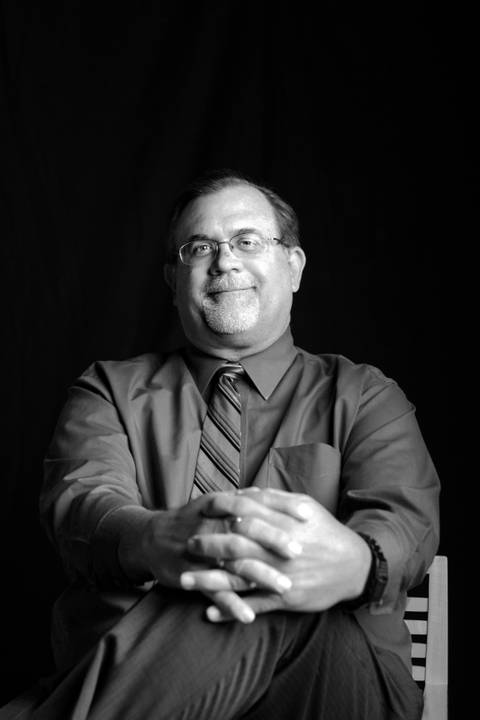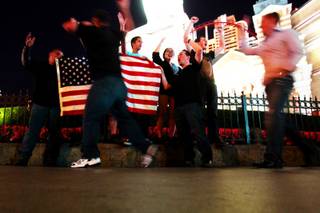Sun Archives
- Post-Osama bin Laden life isn’t that different (5-9-11)
- Release photos of dead Osama bin Laden? Harry Reid, Joe Heck disagree (5-3-11)
- Harry Reid informed ‘in general terms’ about attack on Osama bin Laden (5-2-11)
- Osama bin Laden dies in firefight; Nevada delegation praises action (5-1-11)
- Group gathers at ‘patriotic’ New York-New York after hearing news (5-1-11)
Obama's announcement
God bless Mark Twain, who once said, “I’ve never wished a man dead, but I have read some obituaries with great pleasure.”
Like many of you, I’m sure, I watched the events of the night of May 1 with mixed emotions.
On one hand, I was elated that we finally got him. On the other, I was horrified that the event took on such a celebratory mood.
It was satisfying that a man who forever changed the lives of Americans—the way we travel and the precautions we’re required to take whenever we go anywhere—had met his demise. It was worrisome that some perceive the death of Osama Bin Laden as some kind of line of demarcation and that the world is a better place today as a result.
I wanted to personally shake hands with the members of the Special Ops team that choppered into a dangerous mission to take out Public Enemy No. 1. But I wanted jubilant Americans who began partying afterward to cool it.
Instead of answering a lot of questions, the announcement of Osama Bin Laden’s death raised even more: What does the action say for our system of justice and “innocent until proven guilty?” Or was there enough evidence to support that justice done and the Navy SEALs were appropriate executioners for a mass murderer? Will we ever know the names of those heroes who stormed the compound in Abbottabad, Pakistan, and fired the shots that killed Bin Laden or will it be kept a secret like Woodward and Bernstein’s “Deep Throat” source? If the identities of the SEALs are made public, would they and their families be forever in danger from those who would want to exact revenge? How did Americans traveling abroad feel about the news? All of a sudden, depending on where they were, they may have immediately become more vulnerable.
Will the conspiracy theorists ever be convinced that Bin Laden is dead or will the urban legend grow that, like Elvis and D.B. Cooper, he’s still alive? Aren’t these stories perpetrated by the same people who say the government was behind 9/11, that Lee Harvey Oswald didn’t act alone and that Apollo 11 never landed on the moon?
Wasn’t it just a little creepy that before the announcement Sunday night that Lara Logan described on 60 Minutes her ordeal of being sexually assaulted by a frenzied mob caught up in the fall of Hosni Mubarak’s government in Egypt and then she was one of CBS’ lead reporters on the Bin Laden story, a report that built frenzied crowds in the United States?
The most important question, at least from the perspective of Southern Nevada’s tourism industry, is what does Osama Bin Laden’s death mean to us?
The answer appears to be “very little.”
For years, we’ve been told that Las Vegas, a symbol of Western decadence to so many, is a terrorist target. That isn’t likely to change with Osama Bin Laden out of the picture.
The city’s tourism leaders continue to send the message of maintaining vigilance. Because our city is so invested in keeping its guests safe, it’s only natural that we continue the legacy. There’s a reason why we have more security cameras per square foot than any city in America. It’s to protect our assets and that investment in safety. There’s a reason why employees at our resorts are trained to spot and report things that don’t seem right.
The day after Bin Laden’s death was reported, the Transportation Security Administration and the Homeland Security Department reported no change in the security alert level. Our airports were no more or no less safe than they were two days earlier. Understandably, the death of Osama Bin Laden provoked a broad range of emotions, from joy and elation to worry and concern. What it didn’t do was change what we have become—far more careful than we ever thought we had to be.
Some of us will be able to regale our grandkids with stories about how we once were able to wander out to airport gates without having to walk through a metal and explosives detector. But the man whose terror forever changed how we travel has taken us to a place from which we can’t return.
And his death won’t change that.

